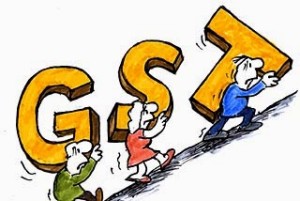The Goods and Services Tax (GST) Council headed by Finance Minister Arun Jaitley, approved the primary drafts of Central GST and State GST laws on December 23 at the 7th meeting of GST Council in New Delhi.
With this the council moved a step closer to bring the GST into implementation. However, the issues related to IGST and dual control remained to be sorted out.
Issues Agreed Upon in the Meeting
The primary drafts of CGST and SGST laws have been approved. The legally vetted copy of the drafts will be circulated to all the states.
- Under GST, the states and the Centre will collect identical rates of taxes on goods and services. For instance, if 18 percent is the GST rate on a good, the states and the Centre will get 9 percent each called the CGST and SGST rates.
- Finance Minister Arun Jaitley stated that a total of 197 provisions and five schedules have been approved for the CGST and GST draft laws. CGST is to be approved by Parliament while the SGST to be approved by States legislative Assemblies.
- The GST Council agreed for compensating the states for any loss of revenue for five years due to the implementation of GST.
- The centre estimates total compensation to states for losses arising from a transition to GST to be around Rs. 50,000 crore in the first year. The compensation to the states will be paid in every two month from revenues raised through a cess on luxury and sin goods, such as tobacco.
Next Meeting of GST Council
The Council will meet again on January 3 and 4 to discuss the contentious issue of dual control. It will also deal with the issue of Integrated GST (IGST) Bill.
- Since wordings/ language of the CGST and SGST laws require redrafting, revised draft of would be circulated to the States for finalizing after being framed in legal language in the next meeting.

- The next meeting would also discuss the states proposals for the union Budget of 2017-18.
- Dual control is an issue on which Centre and states have argument with each other about who will gain how much control over the taxpayer base of VAT, excise and service tax after the rollout of the proposed indirect tax regime. The resolution of the issue of dual control is crucial for the rollout of the indirect tax regime by next year.
- The IGST mechanism has been designed to ensure seamless flow of input tax credit from one state to another. States want control over administering the IGST mechanism. However, the union law ministry is of the view that only the Centre should have administrative authority over IGST.
About GST Council
The GST bill seeks to set up a GST Council. The GST Council aims to develop a harmonized national market of goods and services. According the GST Bill, the President must constitute a GST Council within sixty days of this Act coming into force.
Composition
- The Council is chaired by Finance Minister Arun Jaitley.
- The Union Finance Minister (as Chairman)
- The Union Minister of State in charge of Revenue or Finance
- The Minister in charge of Finance or Taxation or any other Minister nominated by each state government.
Responsibility of GST Council
The GST Council will decide the tax rate and recommend the taxes to be subsumed and exempted from GST.
- It is the council’s responsibility to have one uniform rate of GST tax to be introduced all over India. It will also decide the threshold for levy of the tax, as well as the dispute resolution mechanism.
- Apart from these, it will also decide special rates during adversities and special provisions for some states.






